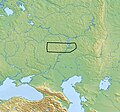Novotitarovskaya culture (miswritten Novotitorovka culture), was a Bronze Age archaeological culture which flourished in the North Caucasus ca. 3300–2700...
3 KB (197 words) - 08:42, 25 November 2023
The Sintashta culture is a Middle Bronze Age archaeological culture of the Southern Urals, dated to the period c. 2200–1900 BCE. It is the first phase...
46 KB (4,908 words) - 14:33, 20 October 2024
Kurgan hypothesis (redirect from Kurgan culture)
prehistoric cultures, including the Yamnaya (or Pit Grave) culture and its predecessors. In the 2000s, David Anthony instead used the core Yamnaya culture and...
34 KB (3,818 words) - 02:41, 26 August 2024
The Andronovo culture is a collection of similar local Late Bronze Age cultures that flourished c. 2000–1150 BC, spanning from the southern Urals to the...
64 KB (7,136 words) - 05:31, 21 November 2024
Bronze Age. Corded Ware culture encompassed a vast area, from the contact zone between the Yamnaya culture and the Corded Ware culture in south Central Europe...
78 KB (9,104 words) - 22:28, 16 November 2024
apparently influenced it. To the north is the Yamna culture, including the Novotitarovskaya culture (3300—2700), which it overlaps in territorial extent...
22 KB (2,607 words) - 19:27, 20 October 2024
Catacomb culture. In addition to the Yamnaya culture, the Catacomb culture displays links with the earlier Sredny Stog culture, the Afanasievo culture and...
28 KB (3,353 words) - 14:11, 20 October 2024
The Únětice culture, Aunjetitz culture or Unetician culture (Czech: Únětická kultura, German: Aunjetitzer Kultur, Polish: Kultura unietycka, Slovak: Únětická...
78 KB (8,275 words) - 17:04, 13 November 2024
Afanasievo culture, or Afanasevo culture (Afanasevan culture) (Russian: Афанасьевская культура Afanas'yevskaya kul'tura), is an early archaeological culture of...
62 KB (6,056 words) - 22:17, 14 November 2024
The Bell Beaker culture, also known as the Bell Beaker complex or Bell Beaker phenomenon, is an archaeological culture named after the inverted-bell beaker...
166 KB (19,275 words) - 22:39, 16 November 2024
Sarmatians (redirect from Sarmatian culture)
of the Eurasian Steppe, the Sarmatians were part of the wider Scythian cultures. They started migrating westward around the fourth and third centuries...
81 KB (8,706 words) - 10:17, 21 November 2024
The Mykhailivka Culture, Mikhaylovka culture, Lower Mykhaylivka culture (3600—3000 BCE) is a Copper Age archaeological culture which flourished on the...
2 KB (230 words) - 17:18, 23 July 2024
The Samara culture is an Eneolithic (Copper Age) culture dating to the turn of the 5th millennium BCE, at the Samara Bend of the Volga River (modern Russia)...
13 KB (1,336 words) - 00:51, 14 November 2024
Timber-grave culture, was a Late Bronze Age 1900–1200 BC culture in the eastern part of the Pontic–Caspian steppe. It is a successor of the Yamna culture, the...
16 KB (1,630 words) - 04:49, 24 October 2024
Iranian peoples (section Sintashta–Petrovka culture)
The Sintashta culture, also known as the Sintashta–Petrovka culture or Sintashta–Arkaim culture, is a Bronze Age archaeological culture of the northern...
119 KB (12,605 words) - 13:07, 15 November 2024
The Battle Axe culture, also called Boat Axe culture, is a Chalcolithic culture that flourished in the coastal areas of the south of the Scandinavian Peninsula...
20 KB (2,476 words) - 13:25, 2 May 2024
romanized: Serednʹostohivsʹka kulʹtura) or Serednii Stih culture is a pre-Kurgan archaeological culture from the mid. 5th – mid. 4th millennia BC. It is named...
24 KB (2,676 words) - 23:13, 23 October 2024
Cimmerians (redirect from Kimmerian culture)
other early nomadic cultures of the Eurasian steppe and forest steppe which existed before the 7th century BC, such as the Aržan culture, so that these various...
169 KB (20,510 words) - 23:45, 19 November 2024
Proto-Indo-European society (redirect from Proto-Indo-European culture)
Proto-Indo-European society is the reconstructed culture of Proto-Indo-Europeans, the ancient speakers of the Proto-Indo-European language, ancestor of...
78 KB (9,373 words) - 07:05, 21 October 2024
49.551376°E / 52.741254; 49.551376 The Khvalynsk culture is a Middle Copper Age Eneolithic culture (c. 4,900 – 3,500 BC) of the middle Volga region....
14 KB (1,684 words) - 05:16, 24 October 2024
The Abashevo culture (Russian: Абашевская культура, romanized: Abashevskaya kul'tura) is a late Middle Bronze Age archaeological culture, ca. 2200–1850...
25 KB (2,936 words) - 00:38, 21 November 2024
Fatyanovo–Balanovo culture (Russian: Фатьяновская культура, romanized: Fatyanovskaya kul'tura) was a Chalcolithic and early Bronze Age culture within the wider...
24 KB (2,795 words) - 21:24, 31 October 2024
The Scythian culture was an Iron Age archaeological culture which flourished on the Pontic-Caspian steppe in Eastern Europe from about 700 BC to 200 AD...
95 KB (13,137 words) - 20:07, 13 October 2024
Indo-Aryans developed, are identified with the Sintashta culture (2100–1800 BCE), and the Andronovo culture,[citation needed] which flourished ca. 1800–1400 BCE...
20 KB (1,597 words) - 04:24, 20 November 2024
dialects that later gave rise in Europe to the Corded Ware and Bell Beaker cultures. Yamnaya steppe pastoralists apparently migrated into the Balkans about...
35 KB (3,492 words) - 19:07, 28 October 2024
Gaels (redirect from Gaelic culture)
languages comprising Irish, Manx and Scottish Gaelic. Gaelic language and culture originated in Ireland, extending to Dál Riata in western Scotland. In antiquity...
94 KB (10,096 words) - 20:24, 22 October 2024
Yamnaya culture was the Catacomb culture. Along with the Sredny Stog culture, the Yamnaya culture and the Catacomb culture, the Poltavka culture is among...
17 KB (2,143 words) - 18:43, 6 November 2024
Dacians (redirect from Dacian culture)
Carpi a distinct material culture, "a developed form of the Geto-Dacian La Tene culture", often known as the Poienesti culture, which is characteristic...
124 KB (15,208 words) - 18:43, 20 October 2024
The Lola culture (Russian: Лолинская культура, romanized: Lolinskaya kul'tura) was a Middle Bronze Age culture which flourished in the North Caucasus...
6 KB (614 words) - 17:20, 10 November 2024
Italic peoples (redirect from Italic culture)
are the Remedello culture and Rinaldone culture in Northern and Central Italy, and the Gaudo culture of Southern Italy. These cultures were led by a warrior-aristocracy...
25 KB (2,732 words) - 21:47, 26 September 2024


























